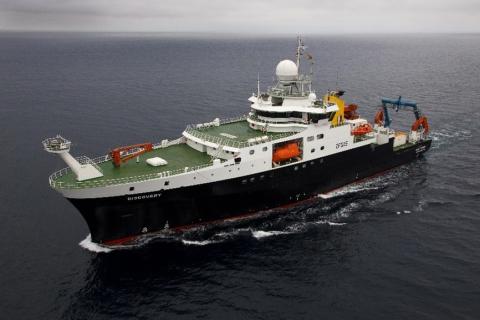
Two ambitious research expeditions have successfully been completed in the BIO-Carbon programme. Timed to target key seasonal transitions in the North Atlantic, they advanced our understanding of how marine life contributes to carbon storage in the ocean. In addition to the work carried out by scientists at sea, a complex mission using multiple robots was conducted.
The pioneering fieldwork was led by experts from Heriot-Watt University, University of Southampton and the National Oceanography Centre, funded by the Natural Environment Research Council. The study included three major BIO-Carbon projects, CHALKY, IDAPro and PARTITRICS, each focusing on different aspects of the ocean’s role in carbon cycling.
The first expedition set sail in May 2024, comprising of 37 days in the North Atlantic, south of Iceland, aboard the RRS Discovery. During this time, the team deployed equipment including a floating laboratory and gliders to help collect the rare data sets. During the expedition, scientists encountered a huge coccolithophore bloom covering an area roughly the size of Scotland. The expedition highlights were covered in a BBC article.

In September 2024, the programme’s second expedition aboard the RRS James Cook built on findings from earlier in the year. The scientists and crew carried out further BIO-Carbon fieldwork and retrieved gliders deployed in spring.

The expeditions also benefitted from a milestone in autonomous data collection, with the first dual deployment of Autosub Long Range better known as “Boaty McBoatface” and the first country-to-country mission for these vehicles.
Throughout the second expedition, an early career researcher onboard produced a series of engaging videos offering a unique perspective on life at sea and the cutting-edge research being conducted. These videos delve into various aspects of the programme:
- Onboard the RRS James Cook: Unlocking the role of marine life in ocean carbon storage
- Why ocean scientists measure chlorophyll data from satellite
- Zooplankton research highlights key role in marine carbon storage
- Are coccolithophores the antiheroes of the biological carbon pump?
To find out more about the past expeditions and ongoing projects visit https://bio-carbon.ac.uk/fieldwork.
- Log in to post comments